2023
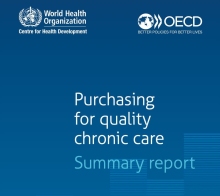
New WKC-OECD publications on purchasing for quality chronic care
Improving the quality of care for people with chronic conditions is central to advancing universal health coverage. Given rapid population ageing, changes are needed in how to pay for chronic care that provides incentives for quality.
On 10 October 2023, the WHO Centre for Health Development (WHO Kobe Centre – WKC) and the Organisation for Economic Co-operation and Development (OECD) released a number of publications dedicated to identifying ways to pay for quality chronic care to ensure good health and physical functioning among adults, including older people. These reports aim to collate the existing evidence on effect of payment methods on quality and outcome for chronic care, while commissioning new studies to understand the mechanisms that can explain this impact. WKC collaborated with the OECD and eight country research teams (Australia, Canada, Chile, China, Germany, Indonesia, South Africa and Spain) to carry out case studies on implementation arrangements for payment methods that reward quality for chronic care. It is hoped that this encourages sharing of lessons learned across different settings.
Among the findings of this research was that healthcare delivery models should be the focus of payment arrangements, and more efforts are needed to systematically identify obstacles that inhibit quality. This may enable policymakers to focus on quality and health outcomes for the population as a whole and to identify the appropriate mix of purchasing mechanisms that support service delivery reforms to achieve quality objectives for older people.
Evidence also points out the importance of learning from past experiences about the design and evaluation of payment methods, including how lessons learned can be systematically adapted across different country contexts. The lessons learned from this research study may be useful for countries that are looking to other settings for experiences in optimizing purchasing arrangements and payment methods to provide better quality care for patients with chronic diseases.
Publications and related documents can be accessed from the links below:
- Summary report
- Policy brief series
- Case studies: Australia, Canada, Chile, China, Germany, Indonesia, South Africa and Spain
Visit the project page on our website here.
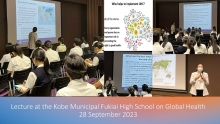
Lecture for students at the Kobe Municipal Fukiai High School by Director of WHO Kobe Centre
Dr Sarah L. Barber, Director, WHO Kobe Centre, gave a lecture to students at the Fukiai High School on 28 September 2023. The title of the lecture was Global Health. The students engaged actively to discuss one public health problem, on tobacco control, with school mates and expressed their opinion on how they, as student, can do to promote smoke free environment and good health within each one of their communities.
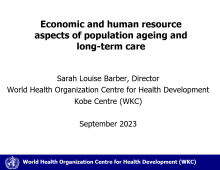
Population Health Academic Advisory Panel (PHAAP) Meeting
Dr Sarah Louise Barber, Director WHO Kobe Centre (WKC) attended the Population Health Academic Advisory Panel (PHAAP) Meeting on 25-26 September 2023 at the invitation of the Deputy Group Chief Executive Officer for SingHealth Regional Health System to provide inputs relating to Population Health research, connecting SingHealth to the global health community. Dr Barber gave presentations about WKC’s research agenda about Sustainable Health Financing in the context of population ageing, in attendance with colleagues and faculty from Singhealth and Duke University School of Medicine, Ministry of Health, Ministry of Social and Family Development, and other government and community representatives.
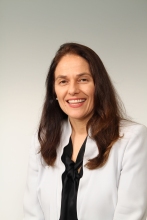
Director’s message for International Day of Older Persons
Every first of October, Japan along with the international community celebrates “International Day of Older Persons”. This Day honours and appreciates the contributions of senior citizens to society.
Most countries in the world now face similar challenges as Japan with a large and growing older population who requires integrated health and social systems that are prepared to respond to their changing needs. The capacity to provide quality chronic care is an essential feature of health systems especially in the context of population ageing.
WHO Centre for Health Development (WHO Kobe Centre – WKC) aims to ensure that health systems everywhere enable older people to enjoy their right to health. We work with partners across the globe and in the Kansai region of Japan to identify factors that affect equitable access to health and social care services for older people. We draw on lessons from the Kansai region and the Asia Pacific Region more widely to inform global policy development and help national authorities take appropriate action to address the inequities that older people face in accessing needed care.
WKC will soon release a number of publications dedicated to identifying ways to pay for quality chronic care to ensure good health and physical functioning among adults, including older people. WKC collaborated with the Organisation for Economic Co-operation and Development (OECD) and eight country research teams to carry out case studies on purchasing and payment arrangements for quality chronic care.
The research found that healthcare delivery models should be the focus of payment arrangements, and more efforts are needed to systematically identify obstacles that inhibit quality. This may enable policymakers to focus on quality and health outcomes for the population as a whole and to identify the appropriate mix of purchasing mechanisms that support service delivery reforms to achieve quality objectives for older people.
The full report and policy briefs will be available here.
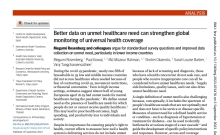
Measuring unmet healthcare needs would add considerable value to global UHC monitoring
As countries accelerate efforts to advance universal health coverage (UHC), one of the 12 targets of the Sustainable Development Goals on health and well-being, it is essential to effectively track the progress and identify what gaps exist. There are two indicators to measure UHC (health service coverage and catastrophic health spending), but neither captures levels of unmet needs as they only include people who have actually received care. Despite its importance, there is no standardised global data on how many people forgo care and for what reasons. To address this problem, the WHO Centre for Health Development (WHO Kobe Centre – WKC) has been conducting research into the unmet healthcare needs, particularly of older populations.
On 5 September, WKC’s Megumi Rosenberg and Sarah L. Barber, together with WKC Advisory Committee Chair, Viroj Tangcharoensathien and research partners, Paul Kowal, Mizanur Rahman, and Shohei Okamoto, published an article in the BMJ calling for better data on unmet healthcare need to feed into global UHC monitoring. They point out that there is no globally agreed definition of unmet healthcare needs. Defining it is challenging because many factors, such as social determinants of health, individual values, health literacy, and current symptoms, strongly influence the likelihood of having unmet needs. Complexities in defining unmet needs also make its measurement challenging, particularly in low- and middle-income countries where questions about unmet needs are not often asked in population surveys. The authors affirm that a standard operational definition of unmet healthcare needs and reasons for it should be developed. Standardised survey questions are also needed to identify unmet healthcare need that is not bound to a single health intervention or disease and that explains access barriers. These data can help understand the experiences of people with conditions not captured by current UHC indicators and would help track progress toward UHC more precisely.
Some of this WKC research is also featured in the upcoming WHO-World Bank UHC Global Monitoring Report 2023 launched on 18 September. These publications are expected to inform discussions at the United Nations High-level Meeting on UHC in New York City on 21 September 2023. As requested in the 76th World Health Assembly resolution in 2023, it is an opportunity to discuss the importance and feasibility of using unmet needs for healthcare services as an additional indicator to monitor UHC progress.
Details of the relevant research projects WKC and the authors conducted can be found in the following pages.
- Multi-country cross-sectional and longitudinal studies to quantify unmet needs for health and social care among older people
- Systematic review and meta-analysis: financial barriers to accessing health services and unmet healthcare needs
- Household survey analysis of financial hardship due to health spending and unmet care needs of older people in Japan with implications for the Kansai region
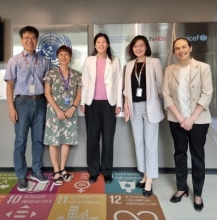
Workshop to support the Government of Viet Nam in health price setting and regulation
Dr Sarah L. Barber, Director of the WHO Kobe Centre was invited by the WHO Representative Office in Viet Nam to participate in the Workshop on sharing international experiences on price setting and regulation and price management of health services in Hanoi, Viet Nam on 3-4 August. The meeting was attended by over fifty participants and chaired by the Deputy Minister of Health and Deputy Director General, Viet Nam Social Security. Dr Barber presented experiences from the joint WHO/OECD publication on pricing health care services, along with Professor Soonman Kwon, Seoul National University, Ms Ding Wang, WHO Regional Office for the Western Pacific, and Dr Kees van Gool, Independent Health and Aged Care Pricing Authority, Australia. The meeting was organized by Drs Annie Chu and Thi Kim Phuong Nguyen to discuss the roadmap for pricing and payment methods for hospitals in Viet Nam.
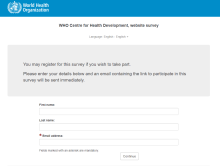
Help us improve our website
We are working on a better version of our website.
Your opinion is important to us.
Please take a few minutes to answer our survey.
Thank you !

2nd Workshop on WHO Mental Health and Psychosocial Support (MHPSS) Capacity Building in Tunisia, 3-6 July 2023
The second workshop in Mental Health and Psychosocial Support (MHPSS) Capacity Building, ‘Building Better Before: Scaling up capacity for mental health and psychosocial support preparedness’ was held on 3-6 July 2023 at the WHO Global Centre for Training in Tunis Tunisia. This 4-day workshop, organised by the WHO Department of Mental Health and Substance Use, aimed to teach risk and vulnerability assessment to support evidence-based policy making and practice and to strengthen multisectoral preparedness for real-world hazards through multiple exercise, such as live interjections and case developments.
Dr Ryoma Kayano, Technical Officer, from the WHO Kobe Centre joined this workshop for the second time. Dr Kayano said ‘Developing effective MHPSS services at national level or in the filed requires comprehensive risk and vulnerability assessments. This training workshop includes useful and thought-provoking exercise and discussion with delegates from many different countries and organisations who would benefit from having a good understanding of these assessments.’.
Video recordings for the workshop will be available soon.
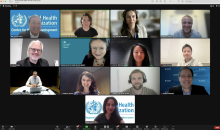
WHO Joint Webinar to Increase Research Capacity for Health Emergencies, 18 July 2023
An online webinar on 'Research capacity building for Health Emergency and Disaster Risk Management (Health EDRM)' took place on 18 July 2023. This webinar was jointly organized by WHO Kobe Centre (WKC), WHO Regional Office for the Eastern Mediterranean (EMRO), and WHO Regional Office for Europe (EURO), aiming to promote research capacity building on Health EDRM and to increase collaboration among policy makers and researchers.
174 government officials, researchers, and WHO officers joined the webinar to listen to the insightful and thought-provoking presentations by the world leading Health EDRM experts. Dr Ryoma Kayano, technical officer at the WHO Kobe Centre, facilitated the webinar in collaboration with Dr Jehan Al-Badri (EMRO) and Dr Tanja Schmidt (EURO). Dr Kayano wrapped up the webinar, emphasing a strong need to involve many stakeholders and to create more opportunities and to promote the use of the WHO Guidance on Research Methods for Health Emergency and Disaster Risk Management for research capacity building.
PowerPoint presentations are available in the programme as below:
------------------------------------------------------------------------------------------------------------------------------
Webinar Programme
Opening remarks
Amgad ElKholy (Team Lead, EM/RGO/WHE/CPI), on behalf of Dalia Samhouri (Regional Manager, EM/RGO/WHE/CPI)
Sarah Louise Barber (Director, HQ/HEP/WKC)
Session 1 - Expert presentations: key knowledge to plan, conduct and report research project before, during and after emergencies and disasters
Moderator: Jonathan Abrahams (Monash University)
- Introduction: Ryoma Kayano (HQ/HEP/WKC), and Kai Von Harbou (EM/RGO/WHE/CPI)
- Identifying and understanding the problem – determining the research questions: Mike Clarke (Queen’s University Belfast – Video)
- Key research methods – Quantitative research methods: Shuhei Nomura (Keio University)
- Key research methods – Qualitative research and mixed methods: Tracey O’Sullivan (University of Ottawa – Video)
- Special topic – research in the context of COVID-19: Virginia Murray, (UKHSA), Ryoma Kayano
- Special topic – research in the context of fragility, conflict and violence (FCV): Hamid Khankeh (USWR)
Session 2- Key challenges in regions and countries
Moderator: Jehan Al-Badri (EM/RGO/WHE/CPI), Tanja Schmidt (EM/RGO/WHE/CPI)
- Policy challenges and research questions in EMRO: Fadi El-Jardali (K2P)
- Policy challenges and research questions in EURO: Atle Fretheim (CEIR)
- Expert feedback: Shuhei Nomura and Jonathan Abrahams (Brief feedback on Session 2 presentations)
Session 3- Comments and feedback – Linkage with existing WHO initiatives
Moderator: Virginia Murray (UK Health Security Agency)
- Operational and Implementation Research Agenda for Health Security Preparedness: Nirmal Kandel (HQ/WPE/HSP/EHS)
- Building Better Before: An initiative to scale up mental health and psychosocial support preparedness and risk management: Brandon Gray (HQ/UCN/MSD/MHE)
- Introduction to the WHO Initiative to measure the effectiveness and impact of public health and social measures during health emergencies: Ramona Ludolph (HQ/WPE/EPP/IEP)
Closing remarks
Tanja Schmidt (EM/RGO/WHE/CPI)
------------------------------------------------------------------------------------------------------------------------------
The full programme can be found here.
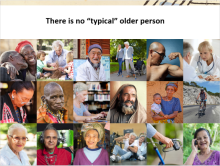
Lecture for students of the Graduate School of Medicine, Juntendo University by Director of WHO Kobe Centre
Dr Sarah L. Barber, Director, WHO Kobe Centre, gave a lecture to students of the International Gerontological Policy Studies for the Master's Course of the Graduate School of Medicine, Juntendo University on 14 July 2023. The title of the lecture was Economic and human resource aspect of aging and long-term care. The students engaged actively in the topic and demonstrated interest in gender aspects of long-term care workforce, selecting cost-effective interventions, combatting ageism, and the application of digital technology in the context of population ageing. The students expressed particular interest in the study conducted by WKC in cooperation with Kobe Municipality on the management of patients with cognitive decline.

